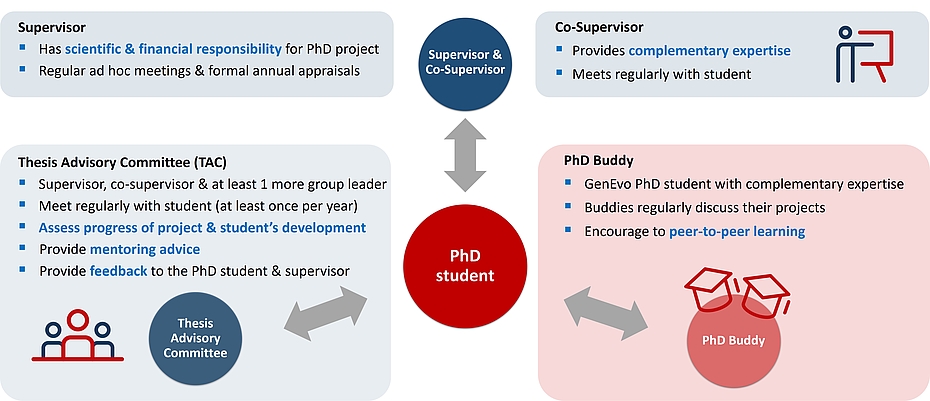Supervision Strategy

Strong interdisciplinary supervision enhances the successful collaboration between Molecular Biology and Evolutionary Biology.
The primary level of supervision is the PhD student’s direct group leader (supervisor), who trains, guides and supports the student in the lab. This includes frequent ad hoc meetings to ensure that the students gain all the research skills needed to conduct their projects as well as regular meetings to plan and interpret experiments, review progress and provide feedback. PhD students also have formal annual appraisals with their group. Group leaders have the scientific and financial responsibility for the PhD projects in their group.
In addition, each PhD student has a co-supervisor. This person is a GenEvo group leader who is working in a different area from the PhD student’s primary supervisor to provide complementary expertise. The co-supervisor is assigned to the PhD student for the duration of their PhD and meets with them on a regular basis.
Furthermore, each PhD student has an assigned Thesis Advisory Committee (TAC). Apart from the supervisor and the co-supervisor, the TAC consitsts of at least two members from outside the PhD student’s group. The TAC meets once a year with the PhD student. It ensures that the PhD student has a well-defined project and sufficient resources to complete it successfully. It assesses the progress of the project and the development of the PhD student, provides feedback on the data generated and their interpretation, as well as on plans for future experiments.
To encourage peer-to-peer learning, interdisciplinary exchange and collaborations, each PhD student has a “PhD Buddy”. This is another GenEvo PhD student, who has complementary expertise and uses different approaches. PhD Buddies are expected to meet and discuss their projects on a regular basis. To become sufficiently involved in their buddy’s research, it is intended that each PhD student presents their buddy’s project in Chalk Talks.
